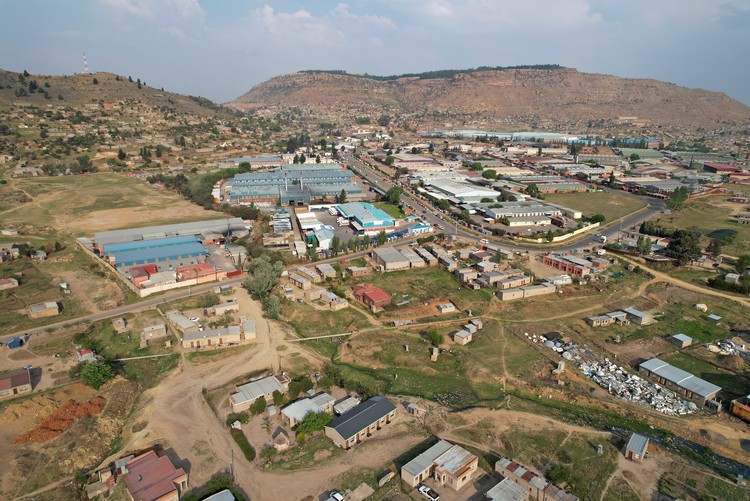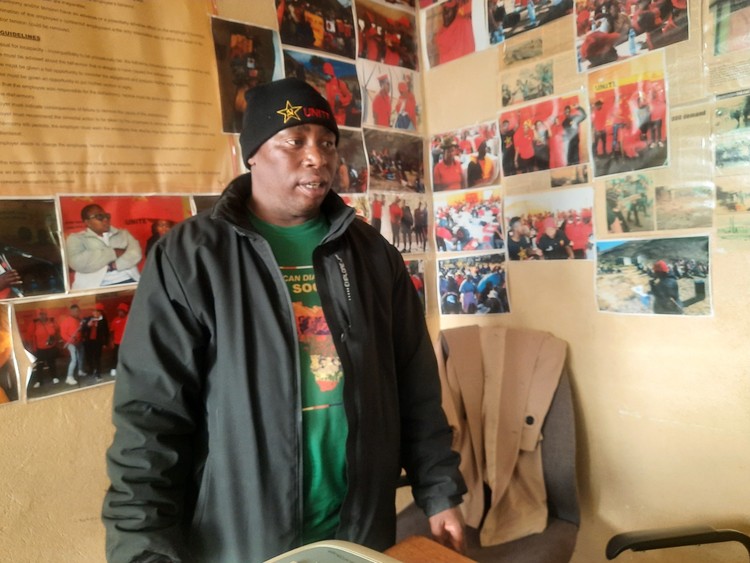Mass lay-offs at Lesotho garment factories as US tariffs bite
After the Trump administration’s threat of 50% import duty on Lesotho, orders have dried up and production lines have shut down
The future of garment factories in Thetsane industrial area in Maseru hangs in the balance as the United States threatens massive tariffs. Photos: Sechaba Mokhethi.
- New orders have plummeted at garment factories after the threat of a 50% US tariff on Lesotho and production lines have shut down.
- Thousands of workers have been sent home, with factory closures expected to last at least three months.
- Government has yet to offer concrete support, while unions warn as many as 20,000 jobs may be at risk.
On 2 April, Jane*, a worker at Leo Garments clothing factory in Lesotho was sent home. She is one of many workers left sitting at home as Lesotho faces a potential 50% tariff hike from the United States.
Until the Trump administration introduced a 10% tariff, Lesotho exported duty free to the US under the African Growth and Opportunity Act (AGOA). An additional 40% tariff was suspended, pending negotiations. But as US buyers weigh the prospect of an imminent hefty tariff, new orders have dried up, forcing many garment factories in Lesotho to suspend production lines.
“Firms that we met are planning a three-month closure, but if there’s no change by September, they may pull out completely,” warns United Textile Employees Union (UNITE) secretary-general Solong Senohe.
“If the tariffs were only 10%, they say they would have no problem staying in Lesotho and their buyers would not have a problem of placing orders. Now Lesotho has a hanging 50% tariff, and no one knows when it will be enforced.”
When Senohe spoke to GroundUp, he had just come from a meeting with Lesotho Precious Garments, who told him no new orders had been placed after the 50% tariff announcement.
In a letter to UNITE, Precious Garments stated that it is “facing a great shortage of orders”. Similar letters were issued last month by TZICC Clothing Manufacturers and Maseru-E-Textile, requesting meetings with UNITE over imminent layoffs.
According to Senohe: “The entire industry is affected … I recently spoke with Nien Hsing International management, and they said that by the end of July, all their American orders would be finished.”
“80% of our clothing exports go to the US, while only 20% go to South Africa,” said Senohe.
The country already faces extreme unemployment. A 2024 Lesotho Labour Force Survey found that 39% of youth aged 15–35 are unemployed.
The garment industry had reportedly already shed 16,000 jobs between March 2018 and March 2024, but with 34,151 jobs officially, it is still the second-largest employer after the public sector. Senohe says the US tariffs have put 20,000 jobs at risk.
On television on Monday, Prime Minister Samuel Matekane said US aid cuts and tariffs “have crippled industries that previously sustained thousands of jobs”.
Workers from Leo Garments, Boming Lai Teng and Precious Garments, speaking to GroundUp on condition of anonymity, say unionised workers have been the first targets for the layoffs.
EFTU general secretary Tšepang Makakole said they had received reports of discrimination against union members and had approached the Ministry of Labour and the Lesotho National Development Corporation for intervention.
Last week, employees at Maseru-E Textile began negotiating with management, demanding half-salaries while at home or severance pay. They had seen workers at other factories laid off without pay.
Shop steward Mathuso Tlale said they became alarmed when they learned that some of the Chinese employers were selling fridges, microwaves and general household items. Maitumeleng Saoane, whose job is to record hourly production at the factory, cited a 2023 example when the owners of a factory vanished over a weekend, leaving unpaid wages.
On Friday, workers held a work stoppage and eventually walked out. On Monday, they found the gates locked and police cars guarding the premises.
Union leaders were allowed in to meet the factory owners. Afterwards, National Clothing Textile and Allied Workers Union secretary general Sam Mokhele told workers they would have to stay home for three months starting July.
He said the employers said they had not budgeted for severance pay, but had agreed to pay those who had worked for the company for two years or more, M1,000 (R1,000) per month. Those with short service would be given their annual leave payment.
South African orders
Kerasemese Rantlhokoane, human resources manager at Lucky Manufacturing, who also oversees operations at Leo Garments and Hong Da, told GroundUp that all three “cut, make, and trim” factories have been hard hit.
“We are now depending on South African orders, but if South Africa gets hit in the same way, we won’t survive,” he said.
He said even with reduced operations, factory owners must still pay rent, utilities, and wages. “That’s why some employers vanish or skip paying salaries for months.”
He said the owner who bought Leo Garments in February last year “is working hard to find new markets … But if it does close, workers will be paid their terminal benefits.”
Chinese staff selling belongings were lower-level staff who rotate in and out, Rantlhokoane said.
Deputy president of the Lesotho Textile Exporters Association Ricky Chang, who is also a director of Nien Hsing Textiles, said US importers are waiting to see if any trade agreement can be reached and at what tariff level. Nien Hsing Textiles produces Levi’s jeans in Lesotho.
If the full 50% tariff is implemented, Chang said, the factories will close or move to other countries. He said some factories have already planned for this and are in discussion with trade unions.
“Lesotho’s textile sector will need the government to act quickly and achieve good results as soon as possible with its US counterparts.”
Appeal to government
In a letter on 5 May to Prime Minister Matekane, UNITE said, “Thousands of Basotho workers are facing three months lay-off without pay”. The union called for discussions with government on how to subsidise workers to mitigate their plight.
On Wednesday, union representatives met Minister of Trade Mokhethi Shelile and Minister of Labour and Employment Tšeliso Mokhosi.
UNITE deputy secretary general Potloloane Monare shared a report on the meeting. The report said the ministers had held virtual meetings with US officials.
“A final decision on the tariffs will be made by July 8, 2025 … But it looks likely that a 10% tariff will be applied to all African countries.”
The report said the government said it lacked the resources to provide financial support for workers sent home and would assess options.
Meanwhile, thousands of workers like Jane will be sent home when factories complete existing orders. Jane can hardly pay her bills. She is weighing up immigrating to Newcastle.
“I don’t want to go illegally, but I’m running out of options,” she said. She has four children to support.
* not her real name
United Textile Employees Union (UNITE) secretary-general Solong Senohe has warned that as many as 20,000 jobs are at stake as the US threatens a 50% import tariff.
Support independent journalism
Donate using Payfast

Don't miss out on the latest news
We respect your privacy, and promise we won't spam you.
Next: New crèches may have to close because of late payments by education department
Previous: There are more than 20,000 unfinished RDP houses in the Free State
© 2025 GroundUp. This article is licensed under a Creative Commons Attribution-NoDerivatives 4.0 International License.
You may republish this article, so long as you credit the authors and GroundUp, and do not change the text. Please include a link back to the original article.
We put an invisible pixel in the article so that we can count traffic to republishers. All analytics tools are solely on our servers. We do not give our logs to any third party. Logs are deleted after two weeks. We do not use any IP address identifying information except to count regional traffic. We are solely interested in counting hits, not tracking users. If you republish, please do not delete the invisible pixel.


